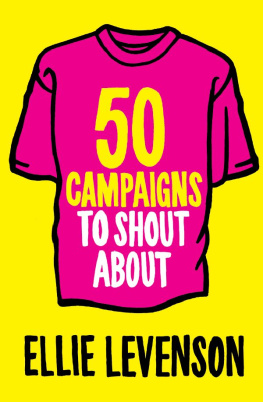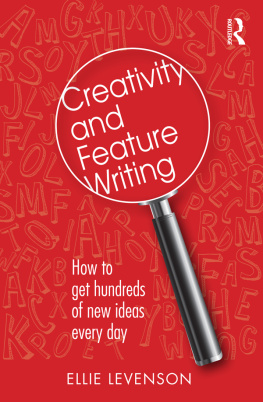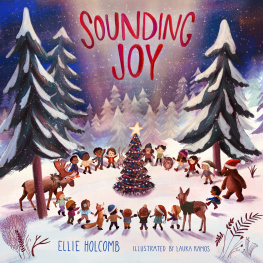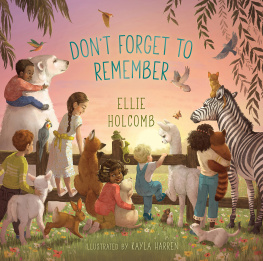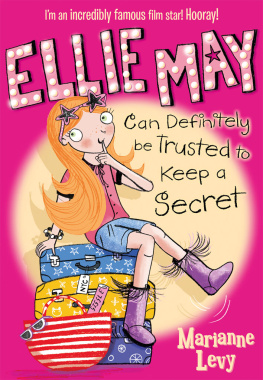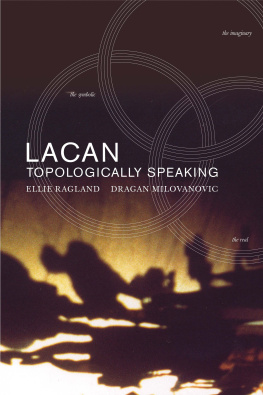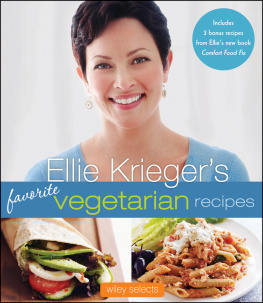50 CAMPAIGNS
TO SHOUT
ABOUT
Also by Ellie Levenson
The Noughtie Girls Guide to Feminism
50 CAMPAIGNS
TO SHOUT
ABOUT
Ellie Levenson

A Oneworld Paperback Original
Published by Oneworld Publications 2011
This ebook edition published by Oneworld Publications 2011
Copyright Ellie Levenson 2011
The moral right of Ellie Levenson to be identified as the Author of this work has been asserted by her in accordance with the Copyright, Designs and Patents Act 1988
All rights reserved
Copyright under Berne Convention
A CIP record for this title is available from the British Library
ISBN 9781851688920
Typeset by Jayvee, Trivandrum, India
Cover design by BoldandNoble.com
Oneworld Publications
185 Banbury Road
Oxford OX2 7AR
England
Learn more about Oneworld. Join our mailing list to find out about our latest titles and special offers at:
www.oneworld-publications.com
Introduction:
Get some issues
Our lives begin to end the day we become silent about things that matter
MARTIN LUTHER KING JR.
Its easy, when watching the news, reading the paper, or just getting on with life and absorbing bits of information about the world, to assume that bad things happen, well, just because life is sometimes unfair, and that unless you have a massive idea and an equally massive amount of money to support you, then theres little you can do about it. But there are many areas in our lives where individuals and groups of individuals can change things, helping to make the world kinder, cleaner, or fairer. From encouraging shops to stock ethical goods to standing up and denouncing racism or homophobia, from asking your elected representative to lobby government on your behalf to doing a spot of guerrilla gardening, we all have the ability to try to make our community, or even the world, a better place.
This book is about getting involved and making a difference. Some people shy away from both of these things; getting involved is seen as being too much like a busybody, and making a difference is seen as impossible. Without wishing to sound like a schmaltzy self-help book, these are just barriers, or excuses. There are loads of small things we can do in our day-to-day lives that make a difference to the issues that we each care deeply about, and some big things we can do too. Whatever it is you care about and I bet there are many things that irk you every day, whether its dog poo on the pavement outside your house, the unfairness of a system that allows bankers to earn millions while the people who clean their offices dont earn a living wage, or the thousands who die each day due to a lack of clean water or healthcare nearly every issue or campaign allows us the opening to do just as much as we feel able to do.
This book identifies fifty such issues or campaigns that offer the opportunity for changing things if enough people take the step to do so.

In the 1940s, the UK government commissioned William Beveridge, an economist and campaigner, to study the social challenges facing the country. The Beveridge Report identified five giants that brought shame to our society: squalor, ignorance, want, idleness, and disease. The report proposed massive reforms to the British system of social welfare which formed the basis of the modern welfare state, including the National Health Service.
Squalor, ignorance, want, idleness, and disease all still exist, and many of the campaigns put forward in this book fit into these categories. But societys modern ills fit into other categories, too. If I were to choose the giants plaguing us today they might include Beveridges five as well as unfairness, lack of compassion, the environment, and a category I can only think to call civilization the idea that a particular ethical or legal situation demeans everyone, such as the existence of a death penalty or the lack of representation for women in a nations structures of power.
Categorizing issues is difficult, though. One of the campaigns in this book is Be kind to refugees and migrants. Kind is an admittedly fluffy word, here encompassing the idea of looking after people who, having left their own country, have arrived in yours with very little; it involves empathy, a need to imagine the insecurity, isolation, and vulnerability these refugees and migrants might feel. They need homes and money and education and jobs, but they also need other people to reach out to them with a feeling of welcome and warmth almost the opposite of what many refugees and migrants currently experience on their arrival. How do you label these sorts of things? Is a campaign on behalf of refugees and migrants about poverty, ignorance, and want? Is it about racial justice, compassion, fairness, and civilization? Or is it about some combination of all of these challenges and aspirations? The boundaries blur.
This book is full of similarly fluffy and soft phrases: be nice, be kind, empathize. I make no apology for that; the world is a better, nicer place when we are, well, nice. When you come to think of it, every campaign Ive included could easily fall under the banner of be nice or be responsible. Thats what making a difference is about.
It is reasonable, however, to agree that we should be nice to one another and yet to still ask what difference ones actions can actually make to a campaign. Its true that sometimes, to really take off, a cause has to capture the public imagination on a large scale. Some years ago, when I was working for the UK-based charity End Child Poverty, I was chatting with a senior editor on a national tabloid newspaper. He said he would put our cause on the papers front page, even highlight every one of the specific policy changes we were advocating for adoption by the government in Westminster, if I could get him photographs of Victoria and David Beckham or someone equally famous holding a tea party for poor British children. But End Child Poverty didnt have celebrity ambassadors, and I seemed to have forgotten to put the Beckhams in my address book. Unless you are working for a charity with a host of celebrities at its disposal, or happen to have a well-known person in the family or living next door, youre unlikely to be able to pull together this kind of photo opportunity either.
But numerous campaigns have proved that you dont need to hold celebrity tea parties to make a difference. Sometimes change can be achieved by getting enough people to write to their MP, by refusing to shop in certain stores, or by working out how to frame an idea such as the realization amongst the campaigners for a workplace smoking ban in the UK that their campaign would be more successful if it was framed as a workers rights issue rather than as a health one.
For some campaigns the most effective thing you can do is get involved personally. Not all of us have the time or inclination to be full-time campaigners, either as a job or in an unpaid capacity, but we can make campaigning part of our everyday lives. Take the campaign to limit the amount of plastic bags and packaging we use. You can do something as small as buy a reusable bag, or you can take the time and effort to send excess packaging back to the companies who use it. Or you can, to take another example, become a school governor. Though it may not be as quick and easy as buying a reusable bag, serving as a governor puts you in a position where you can help write the anti-bullying policy for your local school, ensuring it takes homophobic bullying just as seriously as other types of bullying. Taking action like this wont feel small to you, or to the people being bullied. But its the sort of change that happens person by person, since its not as though bullying is going to make it onto the legislative agenda, and its easy enough for bullies to dismiss a distant celebrity, whom theyll never know, speaking up in an ad campaign.
Next page
